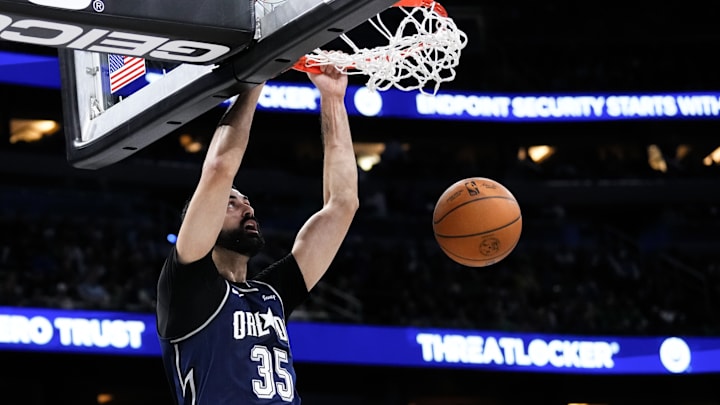With NBA offenses playing much more 5-out offense than ever before (the Orlando Magic included), it allows for players to operate in space and create more threats off of dribble hand-offs and pick and rolls.
In the past, on-ball pick and roll sets have been a multi-step process: The screener sets the pick, the ball-handler waits and picks his side to attack and the screener rolls to set up a basket or draw an extra defender down to allow the ball-handler to create a shot on their own.
Today, that concept has changed. Spacing allows for most teams in the half-court to create a variety of quick and flowing looks of screens to create multiple threats as the play develops.
Magic coach Jamahl Mosley's offensive approach this season lends itself to success within these concepts. In his offense, the ball never sticks. Isolation basketball is present in his offense -- Orlando sits 13th in iso frequency percentage at 7.1 percent -- but efficient.
Paolo Banchero is the only player in the top 20 (and the top 50 for that matter) but sits at less than 15 percent. When the Magic need a late bucket, a couple of times out of 10, they will look to the iso.
Something much more common in the team identity is the use of pick and roll and dribble hand-off sets, specifically to involve Goga Bitadze this season.
With Wendell Carter out for extended points so far in 2023, Jamahl Mosley has done a fantastic job making sure all five of his players are viewed as threats in the half-court. It has resulted in a career year so far for Bitadze, one of the league’s journeymen at his position.
A key playcall for Mosley is “Delay Chicago”. Let’s first breakdown what this play means.
Delay - Delay is a set used in the 5-out offense with puts the center at the top of the key with the ball.
Chicago - The specific origins here are unknown, but the version of the play we will discuss here calls back to Army coach Zack Bosivert noticing a pattern with Derrick Rose and the Chicago Bulls in the early 2010s. He coined “Chicago Action” as a term where the guard (in this case, Rose) receives a down screen in the corner as he works around the perimeter to take the dribble hand-off.
This season, Mosley’s use of Delay Chicago has been huge for Orlando this year.
In this first clip from the Dec. 29 game against the New York Knicks, we see Goga Bitadze initiating the dribble hand-off at the top of the key. Jalen Suggs flashes to the top of the key to take the hand off. While doing so, Banchero sets a screen on Donte DiVincenzo to free up Suggs.
This is a perfect play design on Mosley’s part because it involves their best player in Banchero operating without the ball. He is a threat on the open perimeter just by standing there.
Because of this, Julius Randle, who was previously defending the low block as this play developed, needs to step up on Paolo Banchero once Jalen Suggs drives. As a result, it is a free lob up top to Goga Bitadze over the late-covering Isaiah Hartenstein.
Similar rules apply against the Milwaukee Bucks the week before. Moe Wagner initiates the dribble hand-off look at the top with brother Franz Wagner acting as the “Chicago” guard in the corner. Paolo Banchero again sets the down screen on the perimeter for Franz Wagner and Moe Wagner rolls to the bucket after the hand off.
Giannis Antetokoumpo sniffs out the roll from Moe Wagner after the hand off and does not step up to Paolo Banchero as Julius Randle did in the first clip. Moe Wagner does a great job on the roll, however, getting some contact with Giannis Antetokounmpo to make him think the ball is going out to the wide-open Banchero on the perimeter. Giannis Antetokounmpo fights through the contact just long enough for Moe Wagner to slip under and receive the pass for the basket inside.
This has been extremely effective for Orlando this year. Bitadze is averaging career numbers across the board this year -- 7.5 points per game and 6.3 rebounds per game on 62 percent shooting. With injuries this year to Wendell Carter, many expected to see Moe Wagner shift into the starting lineup given his time with the team and the departure of Bol Bol behind Wendell Carter heading into this season.
Instead, it has been Bitadze who has started 25 games and averaged 22 minutes per game. He has been the perfect stopgap for Orlando as Carter works his way back to 100 percent health.
There is no need to worry about a weak center position. Bitadze has become a solid anchor for one of the league's top Eastern Conference teams, and Jamahl Mosley has orchestrated his offense to make sure he is maximizing the 24-year-old's potential in the halfcourt.
There is a trust Mosley has in Bitadze despite limited action as a starter in his career, and even less so as one of the key options in the halfcourt offense. With the Indiana Pacers, Bitadze mainly was used to clean up the glass, and with the uptick in pace the Pacers set out to achieve last season, he was cast to the side.
Mosley and the Magic saw an opportunity in the former first-round pick. They have built trust and they are shaping plays for all five players on the court to thrive, not just the stars. This is the approach Mosley is taking at the helm this season. And it has working pretty well.
